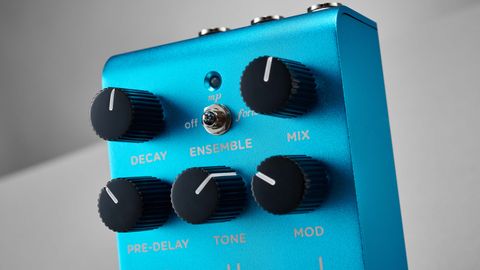Strymon Cloudburst Ambient Reverb Pedal: What is it?

Around 14 years after Damage Control emerged under its new name, Strymon Sound Engineer Pete Celi and the team are still up on algorithm mountain pulling impressive tricks without compromise. Those first Strymon pedals are still selling well, and the US company's story continues with new acclaimed products every year. Not as many as some brands, but its carefully considered releases are proper events in the gear calendar because they continue to deliver.
Strymon products are pricey but in return often prove to be a long-term investment for players. And Strymon’s reverb pedals probably typify this quality/payoff relationship best.
The big daddy BigSky and medium BlueSky are now joined by Stymon’s first truly compact pedal that could be a sign of things to come. The Cloudburst takes one of the BigSky’s modes (Cloud) and adds the Ensemble algorithm that is new to a Strymon pedal. Doesn’t sound like a lot for your $279, does it? The reality is that it’s much more than it sounds. In every way.

Taking the time to explore this pedal is much more than post-rock 101
When was the last time you got so excited by an effects pedal's capabilities you started sending multiple people sound clips of you using it? The Cloudburst is one of those. But after the initial wow factor has settled, it needs to earn its place on your pedalboard for the long term.
Taking the time to explore this pedal is much more than post-rock 101. At home recording and jamming through studio headphones with acoustic and electric guitars, with my live rig isolated and in a band context with other effects, it will reveal different strengths and realities. While it’s easy to get swept away with YouTuber hype and initial stock shortages, every pedal investment needs justification for those of us who need to spend wisely. And whether you’ve never cruised through ambient reverb's cathedral city of sound, or consider yourself a connoisseur, the Cloudburst presents an intriguing combination.

Strymon Cloudburst Ambient Reverb Pedal: Performance and verdict
Before we even plug in, the size is striking – there aren't many digital reverb pedals this small, let alone a Strymon unit. It's a canny move if the Californian company are looking to convince you clear some room on your pedalboards, but we also suspect this could be the start of a new line of products for the brand alongside its familiar dual switch layouts and larger big box pedals. Smart move if so.
The metallic blue finish of the anodised aluminium casing instantly identifies the Cloudburst as part of the BlueSky and BigSky reverb family, and its tie with the latter is especially strong. It's named after one of its modes after all. Is it the same?
Strymon describes it as an "expanded" version and that translates as more sonic versatility for your playing needs. The Decay times in both directions have been expanded significantly for the Cloudburst version to allow for intimate room and even huger ambient space at the extremes.
The BigSky's Low End and Diffusion controls are not present on the Cloudburst, and instead have fixed values that are determined by the setting of the Decay level. The result covers an impressive amount of ground with the sensitive Tone control allowing things to pop more in the mix and be finer-tuned to your pickups. From an always-on smaller room to a cavernous wash from the Decay, there's a very wide scope here .

It won't delight diehard spring fans of course, but that's obviously not the intention; Cloudburst could certainly serve as your only reverb or an excellent second source if you're happy to engage with its impressively scoped controls between songs.
As a UAFX spring reverb user myself, I enjoyed exploring the pre-delay control and the Mix parameters on the Cloud (aka off) mode to soften my note attack. It's an intuitive experience and starts to sell the idea of having two reverb sources on a pedalboard for different applications. And that's before we get the Ensemble show…

The Class A JFET input here already makes its presence felt in the Cloud mode with some of the most touch-sensitive response we've encountered on a reverb pedal. The Cloudburst really is a joy to explore with headphones on a quiet evening, but in Ensemble mode it takes on a whole new meaning.
The obvious applications here are players looking to simulate synth sounds – say in a covers band or adding overdubs to a recording – to solo acoustic performers wanting more accompaniment to follow their chords and fingerpicking
People are already calling Ensemble the new shimmer – in that other makers may now look to integrate their own take on it for pedal designs. But the reality is it is much more nuanced and wider in scope once you start to explore it in different scenarios. But first, what is it?
Ensemble generates harmonics according to your playing dynamics and tonal input; under the hood the Cloudburst is analysing 48 frequency bands and generating harmonic partials for each of them. There's two modes to choose from with Mezzo Piano (MP) and Forte. The first adds a subtle bed beneath the reverb signal, while the Forte is capable of swelling synth string ensemble beds.
The obvious applications here are players looking to simulate synth sounds – say in a covers band or adding overdubs to a recording – to solo acoustic guitar performers wanting moody accompaniment to follow their chords and fingerpicking. This thing can go full Vangelis but what's interesting is both how much it varies on the input instrument and just how well it follows chord voicings. The cello-like qualities with the Decay and Mix set at around 1 o'clock and the Pre-Delay at around 11 O'clock are definitely enhanced by the warmth of our OO-size Auden electro-acoustic with an LR Baggs M-1A soundhole pickup.
Our electric guitars allow for more precise manipulations, but there's this consistent feeling you're conducting the sound in Forte mode, whereas Mezzo Piano is more of an enhancement to add depth and drama to your parts. Exploring the effects of chords reveals the level of dynamic detail Stymon's technology delivers and what could have been a gimmick becomes a stunning textural tool in a compact package.

The Cloudburst's USP is really about the combination of the reverb with the Ensemble and the touch sensitivity Strymon has delivered for it
The Cloudburst definitely suits the moodier end of the player spectrum, but cranking the mix and taking the Decay and Pre-Delay right down and modulation up gets you into proggy '80s synth guitar, taking the Decay up to around 9 o'clock is polysynth territory. It feels more like a synth pedal then but that's not really the primary draw here. The Cloudburst's USP is really about the combination of the reverb with the Ensemble and the touch sensitivity Strymon has delivered for it, because a synth pedal and a reverb pedal will get you a wider variety of sounds but the compact Cloudburst and accessibility for creating great tones and editing them is very compelling during extensive play. Though some of this package is behind a paywall.

The Freeze and Infinite modes, plus the option to access a preset all require Strymon's $49 Mini Switch. Infinite mode means anything you play after activating it will also be added to the infinite pad sound. In Freeze you can play over your pad sound with a dry tone (or effected with anything placed before the Cloudburst in the signal chain).
Both would be useful to have, but the chance to call up a preset is even more essential here with the distinct offerings of room to ambient reverb with Ensemble. None of which can be done out of the box. For a $279 reverb pedal, we have mixed feelings about that. And yet, the quality of the tones in the stock offering is so high many players will accept it and still feel that they have a pedal with sounds no other one-unit proposition can deliver right now. And we'd be among them.
MusicRadar verdict: Believe the hype. The compact Cloudburst sounds immense, but it can also do subtle. Its dynamic sensitivity reflects the expertise Strymon has built its reputation on and although it comes at a price, you could easily fall in love with the sweeping sounds of this modern classic reverb.

Strymon Cloudburst Ambient Reverb Pedal: The web says
"Despite the new scaled-down form factor, the Cloudburst is impressively packed with features, versatility and pure sonic quality. It’s still not cheap, however, and some may find it lacking in options and tweakability compared to its bigger brothers. But for those of us who have been waiting patiently for Strymon to take the step into a more focused and straightforward pedal platform, this more than delivers on its considerable expectations."
Guitar.com
Strymon Cloudburst Ambient Reverb Pedal: Hands-on demos
MusicRadar
Strymon
Andertons
Ambient Endeavors
Chords Of Orion
John Nathan Cordy
Strymon Cloudburst Ambient Reverb Pedal: Specifications

- TYPE: Digital ambient reverb pedal with Ensemble modes
- ORIGIN: USA
- CONTROLS: Decay, Pre-Delay, Tone, Mix, Modulation, Mode mini-toggle
- FEATURES: Switchable mono and stereo modes, MIDI via expression/MIDI jack or USB-C
- BYPASS: True or buffered
- POWER: 9V centre-negative power supply (250mA minimum draw, PSU not included)
- CONTACT: Strymon


